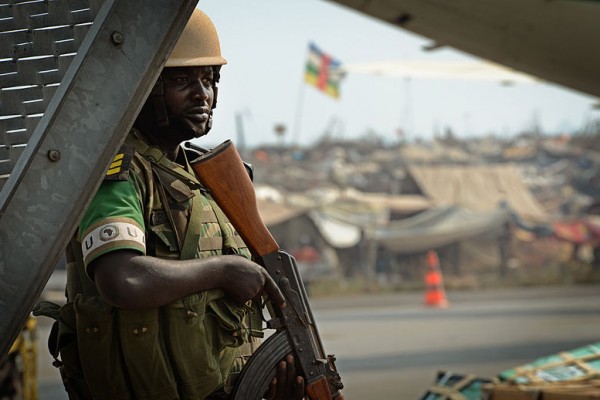At one year from the World Cup, will there be Jogo Bonito for Brazilians? Assessing the social realities of Brazil amidst the anticipation for next year’s World Cup.
The inauguration of the Confederations Cup in which Brazil beat Japan 3-0 left two opposing images. Neymar’s stunner into the top right corner 3 minutes into the game after Fred’s chest pass rose the football aficionados from their seats. Moments before, FIFA’s president Joseph Blatter was booed by the assistants to Brasilia’s Estadio Nacional, showing that the love for football does not necessarily translate into love for FIFA, seen both as the ones who make the World Cup possible and a money-making machine.
The unforeseen costs of the organization have raised voices of protest, while accusations of violence and corruption have left local governments as well as FIFA in a compromising position. Under these tensions, the Confederations Cup will be used by both the authorities and FIFA to judge whether the country is ready for the World Cup a year from now.
The World Cup, along with the Rio 2016 Olympic games, are seen in Brazil as an opportunity to showcase the Latin American giant internationally, as well as to attract tourists and foreign investment. Brazil is ranked as the 6th largest economy in the world, and it wants the international stage to acknowledge its rising transcendence.
Contradicting Realities
Opposite to the cheerful Coca Cola and McDonald’s advertisements, the prospects for the Brazilian people are not necessarily as bright. The social realities they share with South Africa—namely huge inequality, along with corruption and violence—leave us expecting a similar outcome from this World Cup. The negative effects were underreported, almost ignored, in mainstream media.
2010 is marked by FIFA as their most successful World Cup, endorsing around 3.2 billion dollars, a 50% increase from Germany 2006. The main beneficiary was FIFA itself, while South Africa never expected the event to be a revenue raising exercise. As a spokesperson of the South African Revenue Service said: “The concessions we had to give to FIFA are simply too demanding and overwhelming for us to have material monetary benefits.” An exaggerated number of stadiums were built that are now operating at a loss, and South Africans wonder whether they would have benefited more if that money had been directed towards housing, job creation or education.
Despite the huge labor force used for the infrastructure projects, FIFA was not particularly keen on promoting fair working conditions, which led to strikes on part of the workers. The largest of which congregated 70,000 construction workers in July 2009. A 12% increase in their wages resulted, while the CEOs of the building companies earned a 200% increases in salaries from 2006 to 2009. FIFA is not directly linked to the salaries of the workers, but a large part of its profits come from these companies that severely underpaid them.
When choosing the host nation for the World Cup, FIFA has increasingly sought economic opportunities. The hosts also have to conform to certain regulations that sometimes override national sovereignty, inhibiting the freedoms of competition and speech in favor of maintaining the advantageous position of the multinational sponsors. In 2010, Dutch fans were arrested accused of “ambush marketing” for Bavaria brewery. Independently of the existing contracts and of their guilt, the local brands have even less opportunities to expose their products to the tourists—sidelined in their own countries.
All in One Rhythm
With international laws and pressure from corporations come efforts of cleaning the streets. In South Africa attempts were made to close informal markets on which 10,000 people depended for their sustenance, and while this did not succeed the local vendors were effectively sidelined from the stadiums with fee barriers to be paid to FIFA. This is cause for concern in the massive Brazilian informal market that in 2009 absorbed 60% of the national workforce and who will be unable to compete with the international firms—that is, besides the legal barriers that will be erected
What is more, the government in Brazil evicted people from slums in order to build infrastructure or embellish the city, just as had been done in South Africa. This comes at a huge social cost of forcing people to re-start their lives anew somewhere else. That was the case in South Africa were people were moved to the “temporary relocation area” Blikkiesdorp (Tin Can Town) where crime has become rampant. Along similar lines, in Brazil inhabitants of Vila Recreio 2 were evicted in order to build a bus line while in Rio indigenous people were forced out from an old museum site. Instead, a parking lot intended for 10,000 cars will be built (pictures here).
“Juntos num so ritmo” (All in one rhythm) is the slogan of the upcoming World Cup. It is but a cruel irony in the unequal Brazilian society where most people will not be able to attend matches and follow la canarinha due to high transportation and ticket prices.
An optimistic, if naïve, expectation is that Brazil will pay closer attention to the social ramifications that could result from the World Cup instead of giving in to FIFA’s pressures. Giving up some spectacular building programs for transparent and wise investment could provide longer-term financial and social stability. This is rather unlikely however. Considering the elections of Russia and Qatar for the next two World Cups, it is clear that football doesn’t dance to the rhythm of Samba anymore, but to the whims of money. All that is left to hope for is that the so far unimpressive Brazilian team will bring back the jogo bonito so we can rejoice in the superficial propaganda of unity and inclusiveness that FIFA and company sold us.
- Camilo Ucros




